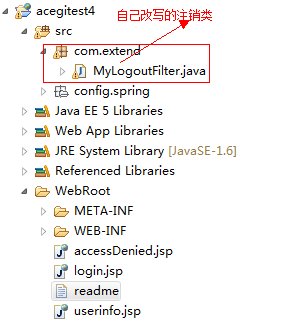acegi security实践教程—简单定制logoutFilter
回顾:
logoutFilter过滤器,我已经带大家了解过了。其中注销是由handler.logout完成的。这就需要在配置文件中配置具体的handler,比如securitycontextlogouthandler,或者tokenbasedremembermeservices,大家可以看到logouthandler具体的实现类如下:
若我程序中就想只用SecurityContextLogoutHandler,对于利用cookie自动登录的效果暂时不需要,我们应该如何做呢?
第一:利用上篇博客的做法,在list中只配置SecurityContextLogoutHandler
第二:重写这个logoutFilter,程序中使用自己的过滤器。
因为上篇博客已经讲解了关键代码,其实那几句关键代码几乎就是整个类代码了。这篇博客同上篇博客的作用一样,实现注销功能,只不过是利用自己Filter而已。
具体开发步骤:
开发环境:
配置文件:
<?xml version="1.0" encoding="UTF-8"?>
<beans xmlns="http://www.springframework.org/schema/beans"
xmlns:xsi="http://www.w3.org/2001/XMLSchema-instance"
xsi:schemaLocation="http://www.springframework.org/schema/beans
http://www.springframework.org/schema/beans/spring-beans-2.0.xsd">
<!-- 通过过滤连形式,acegi提供很多filter,其中过滤器执行也有一定的顺序 ,同事支持正则和ant匹配-->
<bean id="filterChainProxy" class="org.acegisecurity.util.FilterChainProxy">
<property name="filterInvocationDefinitionSource">
<value>
PATTERN_TYPE_APACHE_ANT
/**=httpSessionContextIntegrationFilter,logoutFilter,authenticationProcessingFilter,exceptionTranslationFilter,filterInvocationInterceptor
</value>
</property>
</bean>
<bean id="httpSessionContextIntegrationFilter"
class="org.acegisecurity.context.HttpSessionContextIntegrationFilter" />
<!--自己改写的注销功能-->
<bean id="logoutFilter" class="com.extend.MyLogoutFilter">
<property name="logoutSuccessUrl" value="/login.jsp"/>
</bean>
<!-- 表单认证处理filter -->
<bean id="authenticationProcessingFilter" class="org.acegisecurity.ui.webapp.AuthenticationProcessingFilter">
<!-- 认证管理器,然后委托给Provides -->
<property name="authenticationManager" ref="authenticationManager"/>
<!-- 认证失败后转向的url,包含出错信息的的登陆页面 -->
<property name="authenticationFailureUrl" value="/login.jsp?login_error=1"/>
<!-- 登陆成功后转向的url -->
<property name="defaultTargetUrl" value="/userinfo.jsp"/>
<!-- 登陆的url,这个是默认的acegi自带的 -->
<property name="filterProcessesUrl" value="/j_acegi_security_check"/>
</bean>
<bean id="authenticationManager"
class="org.acegisecurity.providers.ProviderManager">
<property name="providers">
<list>
<ref local="daoAuthenticationProvider" />
</list>
</property>
</bean>
<!-- 从数据库中读取用户信息验证身份 -->
<bean id="daoAuthenticationProvider"
class="org.acegisecurity.providers.dao.DaoAuthenticationProvider">
<property name="userDetailsService" ref="inMemDaoImpl" />
</bean>
<!-- 基于内存实现方式-->
<bean id="inMemDaoImpl"
class="org.acegisecurity.userdetails.memory.InMemoryDaoImpl">
<property name="userMap">
<value>
test=1,ROLE_USER
lisi=1,ROLE_SUPERVISOR
zhangsan=1,ROLE_SUPERVISOR,disabled
</value>
</property>
</bean>
<!-- exception filter -->
<bean id="exceptionTranslationFilter" class="org.acegisecurity.ui.ExceptionTranslationFilter">
<!-- 尚未登录, 进入非法(未认证不可访问)区域 -->
<property name="authenticationEntryPoint">
<bean class="org.acegisecurity.ui.webapp.AuthenticationProcessingFilterEntryPoint">
<property name="loginFormUrl" value="/login.jsp"/> <!--若没登陆,则转向 用户登陆页面 -->
<property name="forceHttps" value="false"/> <!-- 是否强制使用https -->
</bean>
</property>
<!-- 登录后, 进入非授权区域 -->
<property name="accessDeniedHandler">
<bean class="org.acegisecurity.ui.AccessDeniedHandlerImpl">
<property name="errorPage" value="/accessDenied.jsp"/> <!-- 进入无权限页面 ,根据需求写相应的信息-->
</bean>
</property>
</bean>
<bean id="filterInvocationInterceptor"
class="org.acegisecurity.intercept.web.FilterSecurityInterceptor">
<property name="authenticationManager" ref="authenticationManager" />
<property name="accessDecisionManager" ref="httpRequestAccessDecisionManager" />
<property name="objectDefinitionSource">
<value><![CDATA[
CONVERT_URL_TO_LOWERCASE_BEFORE_COMPARISON
PATTERN_TYPE_APACHE_ANT
/userinfo.jsp=ROLE_SUPERVISOR
]]></value>
</property>
</bean>
<bean id="httpRequestAccessDecisionManager"
class="org.acegisecurity.vote.AffirmativeBased">
<property name="decisionVoters">
<list>
<bean class="org.acegisecurity.vote.RoleVoter"/>
</list>
</property>
</bean>
</beans>
自己的Filter:
package com.extend;
/* Copyright 2004, 2005, 2006 Acegi Technology Pty Limited
*
* Licensed under the Apache License, Version 2.0 (the "License");
* you may not use this file except in compliance with the License.
* You may obtain a copy of the License at
*
* http://www.apache.org/licenses/LICENSE-2.0
*
* Unless required by applicable law or agreed to in writing, software
* distributed under the License is distributed on an "AS IS" BASIS,
* WITHOUT WARRANTIES OR CONDITIONS OF ANY KIND, either express or implied.
* See the License for the specific language governing permissions and
* limitations under the License.
*/
import java.io.IOException;
import javax.servlet.Filter;
import javax.servlet.FilterChain;
import javax.servlet.FilterConfig;
import javax.servlet.ServletException;
import javax.servlet.ServletRequest;
import javax.servlet.ServletResponse;
import javax.servlet.http.HttpServletRequest;
import javax.servlet.http.HttpServletResponse;
import javax.servlet.http.HttpSession;
import org.acegisecurity.Authentication;
import org.acegisecurity.context.SecurityContextHolder;
import org.apache.commons.logging.Log;
import org.apache.commons.logging.LogFactory;
import org.springframework.util.Assert;
/**
* Logs a principal out.
* <p>
* Polls a series of {@link LogoutHandler}s. The handlers should be specified in the order they are required.
* Generally you will want to call logout handlers <code>TokenBasedRememberMeServices</code> and
* <code>SecurityContextLogoutHandler</code> (in that order).
* </p>
* <p>
* After logout, the URL specified by {@link #logoutSuccessUrl} will be shown.
* </p>
* <p>
* <b>Do not use this class directly.</b> Instead configure <code>web.xml</code> to use the
* {@link org.acegisecurity.util.FilterToBeanProxy}.
* </p>
*
* @author Ben Alex
* @version $Id: LogoutFilter.java 1967 2007-08-28 11:37:05Z luke_t $
*/
public class MyLogoutFilter implements Filter {
//~ Static fields/initializers =====================================================================================
//~ Instance fields ================================================================================================
private String filterProcessesUrl = "/j_acegi_logout";
private String logoutSuccessUrl;
//~ Methods ========================================================================================================
/**
* Not used. Use IoC container lifecycle methods instead.
*/
public void destroy() {
}
public void doFilter(ServletRequest request, ServletResponse response, FilterChain chain) throws IOException,
ServletException {
if (!(request instanceof HttpServletRequest)) {
throw new ServletException("Can only process HttpServletRequest");
}
if (!(response instanceof HttpServletResponse)) {
throw new ServletException("Can only process HttpServletResponse");
}
HttpServletRequest httpRequest = (HttpServletRequest) request;
HttpServletResponse httpResponse = (HttpServletResponse) response;
if (requiresLogout(httpRequest, httpResponse)) {
Authentication auth = SecurityContextHolder.getContext().getAuthentication();
HttpSession session = httpRequest.getSession(false);
if (session != null) {
session.invalidate();
}
SecurityContextHolder.clearContext();
sendRedirect(httpRequest, httpResponse, logoutSuccessUrl);
return;
}
chain.doFilter(request, response);
}
/**
* Not used. Use IoC container lifecycle methods instead.
*
* @param arg0 ignored
*
* @throws ServletException ignored
*/
public void init(FilterConfig arg0) throws ServletException {
}
/**
* Allow subclasses to modify when a logout should take place.
*
* @param request the request
* @param response the response
*
* @return <code>true</code> if logout should occur, <code>false</code> otherwise
*/
protected boolean requiresLogout(HttpServletRequest request, HttpServletResponse response) {
String uri = request.getRequestURI();
int pathParamIndex = uri.indexOf(';');
if (pathParamIndex > 0) {
// strip everything from the first semi-colon
uri = uri.substring(0, pathParamIndex);
}
int queryParamIndex = uri.indexOf('?');
if (queryParamIndex > 0) {
// strip everything from the first question mark
uri = uri.substring(0, queryParamIndex);
}
if ("".equals(request.getContextPath())) {
return uri.endsWith(filterProcessesUrl);
}
return uri.endsWith(request.getContextPath() + filterProcessesUrl);
}
/**
* Allow subclasses to modify the redirection message.
*
* @param request the request
* @param response the response
* @param url the URL to redirect to
*
* @throws IOException in the event of any failure
*/
protected void sendRedirect(HttpServletRequest request, HttpServletResponse response, String url)
throws IOException {
if (!url.startsWith("http://") && !url.startsWith("https://")) {
url = request.getContextPath() + url;
}
response.sendRedirect(response.encodeRedirectURL(url));
}
public void setFilterProcessesUrl(String filterProcessesUrl) {
Assert.hasText(filterProcessesUrl, "FilterProcessesUrl required");
this.filterProcessesUrl = filterProcessesUrl;
}
protected String getFilterProcessesUrl() {
return filterProcessesUrl;
}
public String getLogoutSuccessUrl() {
return logoutSuccessUrl;
}
public void setLogoutSuccessUrl(String logoutSuccessUrl) {
this.logoutSuccessUrl = logoutSuccessUrl;
}
}
项目下载:
ps:哈哈,这个logoutFilter说白了就是自己改写的,这样的话,配置文件中只配置注销后转向的页面即可。至于如何改写的,这个大家看一眼源码即可,害羞的速速略过啦~
预告:
前几篇完成了一个小雏形,至于这篇算小插曲吧,前几篇从数据库读取用户身份信息是基于内存形式,而非真正数据库中,为了进一步完善,接下来我们开始设计自己的系统或者如何嵌入现有系统。

